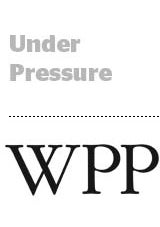Something is wrong with WPP Group – or, perhaps, many somethings.
On its Q3 call with investors Thursday, management detailed a list of ailments longer than that of a septuagenarian overdue for his physical.
North America? “Further weakening.” Creative agencies? “Doing poorly.” Account losses? As bad as you’ve heard.
Revenue was down .8%, and the company warned full-year revenue could decline a full percentage point. Investors fled the stock, which fell 20% in morning trading.
New CEO Mark Read, officially in his job for two months, said the disappointing quarter “reinforces the need for decisive action and radical approaches,” starting with a divestiture of data provider Kantar. WPP will offer more details on its new strategic plan in December.
TTFN KantarKantar has grown more slowly than WPP as a whole over the last decade, and management has concluded the best thing is to sell it, probably next year, to a partner that can bring in more business. WPP expects to retain a minority stake.
The rise of data in marketing has, ironically, disadvantaged agency-owned data businesses, Read said.
“The data insights and consulting business is extremely valuable to our clients, but it’s probably the area of our business that’s been the most disrupted by new technologies and new companies,” he said. “There’s a tremendous amount of information from the internet or from the interactions that are tracked on the internet.”
But WPP would “like to have a strategic relationship with Kantar,” Read added, noting that many WPP clients are also Kantar clients. “We’d like the opportunity to continue to integrate Kantar with our work,” he said.
Media review pain (no gain)
WPP has suffered a string of painful losses on the media side, including American Express, Campbell’s, Mercedes-Benz, United Airlines, HSBC and Bayer.
To be fair, WPP was more exposed to media account losses than its rivals. The holding company, which has more clients overall than many competitors, saw a larger percentage of its clients initiate reviews last spring.
“When you’re the incumbent on a piece of business, it’s often difficult to retain it. It’s hard to make the changes you need to make, sometimes for emotional reasons and sometimes for rational reasons,” Read said.
He cited three causes for the losses:
- “The structures we’ve proposed have been unacceptable to clients or we haven’t achieved the level of integration required.”
- “They’ve found some of the ‘single view of the customer’ technology platforms from our competition easier to understand and more compelling.”
- Price
But, Read quickly added, “Unless you win the first or the second you don’t get into a negotiation over the third.”















